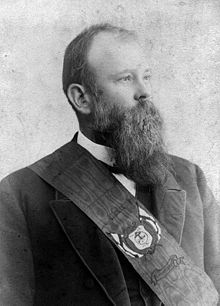Francis William Reitz
| Francis William Reitz | |
|---|---|
 |
|
| 5th State President of the Orange Free State | |
|
In office 10 January 1889 – 11 December 1895 |
|
| Preceded by | Johannes Brand |
| Succeeded by | M.T. Steyn |
| Chief Justice of the Orange Free State | |
|
In office June 1876 – 10 January 1889 |
|
| Preceded by | New office |
| Succeeded by | Unknown |
| State Secretary of the South African Republic | |
|
In office June 1898 – 31 May 1902 |
|
| Preceded by | W.J. Leyds |
| Succeeded by | Office abolished |
| President of the Senate of the Union of South Africa | |
|
In office 1910–1921 |
|
| Preceded by | New office |
| Succeeded by | H.C. van Heerden |
| Personal details | |
| Born |
5 October 1844 Swellendam, Cape Colony |
| Died | 27 March 1934 (aged 89) Cape Town, Cape Province, Union of South Africa |
| Spouse(s) | Blanka Thesen (1854–1887) Cornelia Maria Theresa Mulder (1864–1935) |
| Children | 15 |
| Alma mater | South African College |
| Profession | Lawyer |
| Religion | Dutch Reformed |
Francis William Reitz, Jr. (Swellendam, 5 October 1844 – Cape Town, 27 March 1934) was a South African lawyer, politician, statesman, publicist, and poet who was a member of parliament of the Cape Colony, Chief Justice and fifth State President of the Orange Free State, State Secretary of the South African Republic at the time of the Second Boer War, and the first president of the Senate of the Union of South Africa.
Reitz had an extremely varied political and judicial career that lasted for over forty-five years and spanned four separate political entities: the Cape Colony, the Orange Free State, the South African Republic, and the Union of South Africa. Trained as a lawyer in Cape Town and London, Reitz started off in law practice and diamond prospecting before being appointed Chief Justice of the Orange Free State. In the Orange Free State Reitz played an important role in the modernisation of the legal system and the state's administrative organisation. At the same time he was also prominent in public life, getting involved in the Afrikaner language and culture movement, and cultural life in general.
Reitz was a popular personality, both for his politics and his openness. When State President Brand suddenly died in 1888, Reitz won the presidential elections unopposed. After being re-elected in 1895, subsequently making a trip to Europe, Reitz fell seriously ill, and had to retire. In 1898, now recovered, he was appointed State Secretary of the South African Republic, and became a leading Afrikaner political figure during the Second Boer War. Reluctant to shift allegiance to the British, Reitz went into voluntary exile after the war ended. Several years later he returned to South Africa and set up a law practice again, in Pretoria. In the late 1900s he became involved in politics once more, and upon the declaration of the Union of South Africa in 1910, Reitz was chosen the first president of the Senate.
...
Wikipedia
